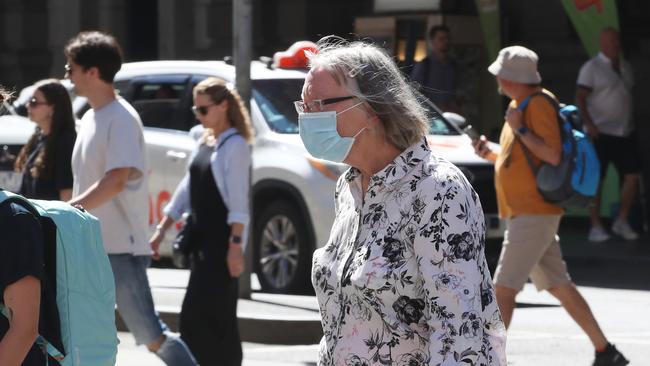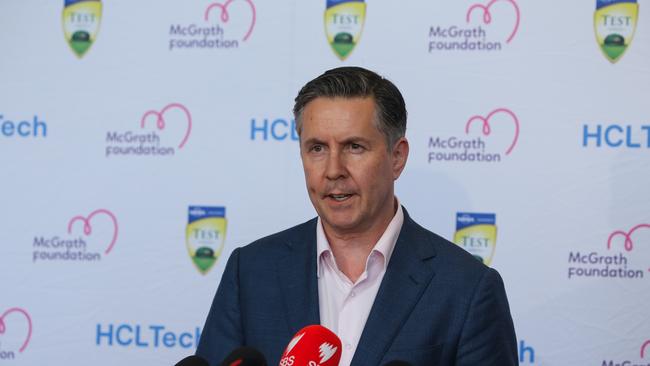Australia in grips of mammoth Covid-19 wave, but experts offer a silver lining
The surge in Covid-19 is unlikely to trigger a reintroduction of a mask mandate - but here’s why it’s here to stay.
News
Don't miss out on the headlines from News. Followed categories will be added to My News.
Australia is unlikely to return to widespread mask mandates, experts say, despite the country grappling with a surge of Covid-19 cases.
In some states, Covid-19 cases are higher than they were last winter, with two highly infectious strains of the virus circulating among the community and hospitalisations increasing.
But crucially, the number of intensive care admissions and deaths linked to Covid-19 has not dramatically risen and epidemiologists say there’s not evidence to show new strains are any more deadly than the common flu.
This week, NSW Health confirmed the state was experiencing the highest level of Covid-19 in over a year, with high transmission rates linked to the Christmas-New Year period.
Around the country, JN. 1 – a strain of Omicron and a subvariant of BA. 2.86 which is also still circulating – is increasingly become the dominant strain of the virus, currently making up almost a third of Covid-19 cases in Australia.

“New strains are emerging all the time – if the virus doesn’t mutate or change it will die out, there’s not much chance of that happening,” infectious diseases physician Peter Collignon said.
“This is going to happen for the next 40 years, it’s not going to go away.”
According to the federal health department, in the four weeks to January 1, the national genomic surveillance system AusTrakka reported that 31.6 per cent of all uploaded sequences belonged to the JN. 1 variant.
But there is “no evidence to suggest the variant was associated with more severe disease”, the health department and experts like Professor Collignon say.
They say that JN. 1 would only become a “worrying problem” if it were “much more severe and more transmissible”.

“The only way to really assess what’s happening is looking at deaths, hospital admissions, and crucially ICU admissions – and that’s less than what it was six months ago and what it was a year ago,” professor Collignon said.
“Every wave we have is having less effect, as judged by serious disease compared to the waves before.
“And that’s what you’d expect when you’ve got a highly immunised population.”
The latest figures available for NSW show an average of 1400 people have presented to the emergency department each week with Covid-19, with 400 admitted for treatment.
In the week to January 5 in Victoria, hospitalisations linked to Covid-19 increased to 377 from 307 the week prior, but Victoria Health say that remains below the winter peak.
Federal Health Minister Mark Butler said there was evidence to show JN. 1 was linked to increased hospitalisations, and “no evidence yet to show that it is any more transmissible or severe than the myriad other Omicron sub-variants that we’ve all been grappling with over the last couple of years”.
Infectious diseases pediatrician Robert Booy, however, said increasing evidence JN. 1 is linked to more hospitalisations will come, but also noted the lack of links to increased deaths.
“That’s what tells you if it’s really more severe or not,” he said.

It’s not just Australia experiencing a surge in cases, with Spain this week reintroducing a mask mandate for hospitals in a bid to slow the surge of dual Covid-19 and influenza cases.
Such a move is unlikely to happen in Australia, experts say, but have warned high-risk Australians to take extra precautions amid the current wave.
They say that Australia has a collective high immunity against serious disease, and mandating masks again will do little to stop the spread beyond situations with high-risk individuals.
Professor Booy said there was a case for reinstating mask requirements on a limited basis, when dealing with highly vulnerable and at-risk people in specific hospital wards and nursing homes, but a wider mandate would do little.
Professor Collignon said as time goes on, the two waves a year Australia has been experiencing in the last few years will taper down to just one winter wave a year.
In the meantime, Covid is “still a problem”, but for as long as deaths attributed to the virus remain down, every new strain is less of an issue.
Originally published as Australia in grips of mammoth Covid-19 wave, but experts offer a silver lining


